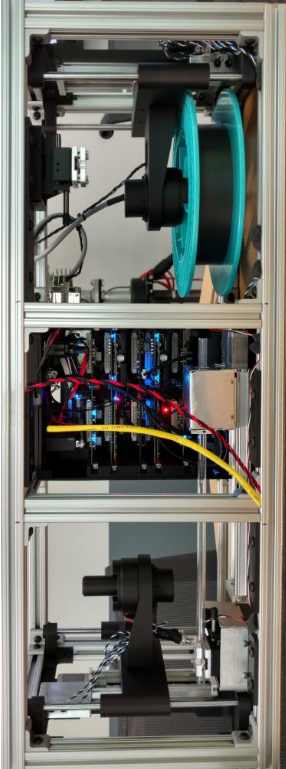Flawless Photonics’ ZBLAN optical fibres can only achieve their ideal theoretical performance if they are produced away from gravity’s influence. Which, of course, means we go up to space!
Optical fibres use light pulses to transmit information along optic cables rather than the electrical pulses employed in copper wire transmission. The use of optical fibre in telecommunications and data communications is rising due to optical fibre’s unbeatable advantages over copper wire such as faster speeds with less signal degradation and greater information carrying capacity. Yet, as data demands grow and our need for broader spectrum bandwidth continuously increases, even the capabilities of conventional silica glass optical fibres are being stretched to their limits.
As a result, there is growing interest in developing extremely low-loss, wider spectrum fibres for data and telecommunications. Flawless Photonics is a California-headquartered company focused on making fluoride-based fibres that incorporate zirconium, barium, lanthanum, aluminium, and sodium (ZBLAN). The theoretical capabilities of special ZBLAN glass far exceed those of silica glass by many times over.
So, what’s the catch? Real-world performance of fluoride fibres does not live up to expectations due to chemistry issues that occur when the fibre is produced under the influence of gravity. ZBLAN optical fibres can only achieve their ideal theoretical performance if they are produced outside of gravity. There is literally nowhere on Earth where these fibres can be optimally fabricated. Which of course means we look to space for the solution!
Flawless Photonics is pioneering the manufacturing and supply chain of next-generation optical fibres from space known as SpaceFiber™. Flawless is the first entity to successfully manufacture optical fibres in microgravity, aboard the International Space Station (ISS).

In April 2019, their prototype space manufacturing platform was delivered to the ISS by the Northrop Grumman robotic resupply spacecraft Cygnus. The platform itself was self-contained and only needed to be plugged in by the crew, after which Flawless Photonics operated the device remotely. Once fabricated, SpaceFiber™ was delivered back to Earth so that the ZBLAN glass fibre can be used terrestrially.
Through a partnership with University of Adelaide’s Prof. Heike Ebendorff-Heidepriem and the ANFF-Optofab Adelaide hub, Flawless Photonics is optimising the glass purification processes, preforming and fibre drawing processes. ANFF-Optofab provides consultancy on ZBLAN glass fabrication, fabrication of ZBLAN samples for testing by Flawless and investigation of methods for raw material purification. ANFF’s Adelaide hub has the capability for ZBLAN glass melting, casting, extrusion and fibre drawing, and now are in the process of building the capability for ZBLAN raw material purification. Together, Flawless Photonics and Adelaide Optofab are working on the next generation of the space manufacturing platform in order to scale up SpaceFiber™ production on the International Space Station.
SpaceFiber™ will revolutionize several industries that currently use optical fibres by enabling entirely new products and applications that simply can’t exist because of silica fibre’s limits and from gravity’s effects on special glass like ZBLAN. From high power fibre lasers in the mid-infrared spectrum, to exceptionally sensitive sensors at MIR wavelengths, to hyper-low-attenuation fibre optic data connections that extend thousands of kilometres without the need for amplification, the sky is literally no longer the limit!
